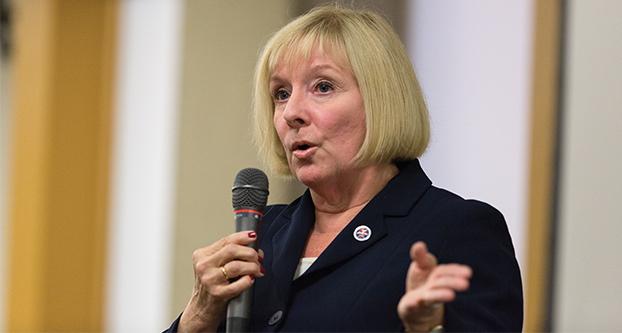Fresno State provost and vice president for academic affairs Lynnette Zelezny held a public forum on Monday in the Henry Madden Library, discussing a range of topics relevant to the state of the campus.
The DISCOVERe tablet program was “moving in the right direction,” Zelezny said, with approximately 1,200 students involved in the program having made savings of 58 percent on their course material.
“That’s exactly what we were looking for,” Zelezny said. “We also have some pretty good preliminary data.”
The data also revealed that the students involved with the DISCOVERe initiative have gone into finals week with average grades a half step higher compared with students who aren’t involved with the program. Teachers are reporting that the engagement during the program is looking favorable, Zelezny said.
The issue of scheduling classes for the spring 2015 semester was also addressed after Zelezny said students tweeted President Joseph Castro about the issues they were having.
“We’re going to actually pilot some block scheduling,” Zelezny said. “We’re going to try a couple of things. They’re experimental. We’ll see if we get some good outcomes.”
Dennis Nef, dean of undergraduate studies, said one concern the school faces in the future for undergraduate studies is the rising number of students the school must reject. The application period for the 2015-16 school year closed on Nov. 30.
“As an open access institution, we are required to admit everybody that’s eligible to apply and does so in time,” Nef said. “We are required to do that to everybody that’s in our service area, and if we had any room, we could admit from outside our service area.
“So most of those 4,000 students that weren’t admitted last year were out of the area. This year, it looks like, it could be that we could admit no out-of-the-area students. Absolutely none.”
These findings have initiated a discussion into looking at possibilities of campuswide impaction that would allow the school to set additional requirements to let candidates in, Nef said. The requirements could include the typical high school GPA and taking the SATs, but also major specific requirements like a prospective engineering student to have taken a trigonometry course in high school.
A request will be sent to the chancellor’s office to ask for the university to have the ability to consider the requirements, Nef said, but it would not be able to do anything until it had approval from the chancellor.
“This is only the very beginning of the conversation,” Zelezny said.
Nef said that the Western Association of Schools and College committee had made recommendations and suggestions for the improvement of the school. This information should be made available in written form next month.




